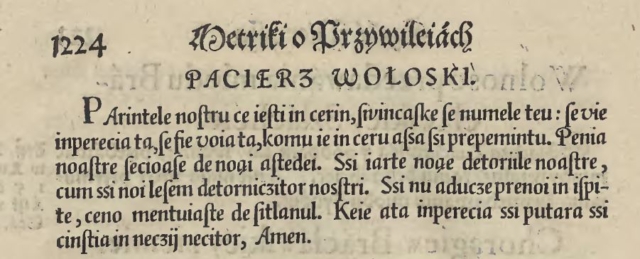Until 19th century, the Romanian language was written using the Cyrillic alphabet. So it’s interesting to find pre-19th century books or documents that have Romanian writings in the Latin alphabet. I believe that the oldest discovered book that has Romanian in Latin alphabet is from 1594. The book is called “Statuta Y Metrika Przywileiow Koronnych Ięzykiem Polskim Spisane, Y porządkiem prawie pzryrodzonym a barzo snadnym nowo zebrane Przez Stanisława Sarnickiego” by Stanisław Sarnicki (Polish historian). The abbreviated English translation of the title is ” Statutes and records of crown privileges“.
On page 1224, the book has the Romanian version of the Lord’s Prayer or Our Father. In Romanian the prayer is called “Tatăl Nostru” (in Latin is Pater Noster or Oratio Dominica). The prayer is written using the Latin alphabet, but of course that the orthography differs a little bit from the modern orthography. After all, the Romanian language probably didn’t even have an official orthography for the Latin alphabet.
The Wallachian Prayer
The prayer is called “Pacierz Wołosky” which is Polish for “Wallachian Prayer” (a more modern translation would be “Romanian Prayer”). I am pretty sure that it’s the Lord’s prayer from Mathews 6:9-13. Below you can see the section from page 1224 that shows the prayer.
The writing is a bit difficult to read since it uses the long S and what seems to be tailed Z. In modern writing the prayer is:
Parintele nostru ce iesti in cerin,
sivincaske se numele teu
se vie imperecia ta, se fie voia ta,
komu ie in ceru assa ssi prepemintu.
Penia noastre secioase de noai astedei
Ssi iarte noae detoriile noastre,
cum ssi noi lesem detorniczitor nosstri.
Ssi nu aducze prenoi in ispite,
ceno mentuiaste de sitlanul.
Keie ata imperecia ssi putara
ssi cinstia in neczij necitor,
Amen”
For comparison, I put the modern Wikipedia version of Mathews 6:9-13.
Tatăl nostru Care ești în ceruri,
sfințească-se numele Tău,
vie împărăția Ta,
fie voia Ta,
precum în cer așa și pe Pământ.
Pâinea noastră cea de toate zilele,
dă-ne-o nouă astăzi
și ne iartă nouă greșalele noastre precum și noi iertăm greșiților noștri
și nu ne duce pe noi în ispită
ci ne izbăvește de cel rău.
Că a Ta este împărăția și puterea și mărirea,
acum și pururea și în vecii vecilor.
Amin.
Some remarks
Overall, the writing can be understood by a modern Romanian. The difficulty is increased by a few spelling mistakes. “cerin” should be “ceriu”, “neczij” should be “veczij” ,and “necitor” should be “vecilor”. Also some words seem to be tied together, like “prenoi” insstead of “pre noi” (“pe noi” is the actual modern form).
It’s also interesting to note that this old version is closer to Latin or other romance languages in some parts. For example, it starts with “Parintele nostru” instead of using ” Tatăl Nostru” . The modern Romanian word “părinte” is related to the Latin word “parens” (also the enlish word “parent”). This version also uses “detoriile” for debts (Latin “debitor), instead of using “greșalele”, which is a Slavic derived word that means “mistakes”.
When people discuss the Romanian language, very often you see people that bring up the “re-latinization” of Romanian. The “re-latinization” of Romanian is mostly the modernization of Romanian in 19th century due to technological changes (industrial revolution) and the political changes (transition to constitutional form of government). A lot of innovations occurred in France, so it is not hard to deduce why a lot of new words were borrowed from French.
However, it seems that some people believe that Romanian was forcefully cleaned of Slavic words. Unfortunately, the evidence from older documents shows that the Romanian language had about the same proportion of Latin and Slavic derived words. Romanian is usually 75% Latin derived and about 15-20% Slavic derived. This old version of the Lord’s prayer probably has a similar distribution of words by origin.

